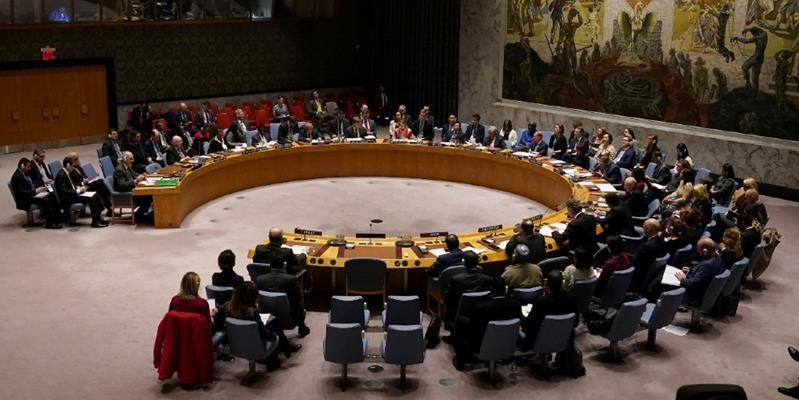
ARGUMENT
U.N. Fails Its ‘Responsibility to Protect’ Civilians in Syria
Russian and Chinese obstructionism puts millions at risk of starvation and disease.
By CHRIS EHLING | AUGUST 10, 2020
 The U.N. Security Council authorized the extension of only one of four humanitarian border crossings in Syria. Photo by Reuters News Agency.
The U.N. Security Council authorized the extension of only one of four humanitarian border crossings in Syria. Photo by Reuters News Agency.
Russia and China have been eroding the U.N.-led humanitarian infrastructure in Syria for years. In the last six months, their obstructionism in the Security Council has resulted in the closing of three out of four border crossings used to deliver food and other aid to millions of Syrian civilians. Unless Western diplomacy manages to change Moscow and Beijing’s behavior, a resurgent refugee crisis could necessitate increased rescue operations in the Mediterranean and exacerbate the ethno-populist acrimony across Europe. This time, those fortunate enough to survive a transcontinental journey would also present a huddled mass of potential viral vectors.
Even without Covid-19, shelter is a luxury in Syria’s mostly rebel-held northwest, pressed against Turkey, where the only open border crossing remains. Syrian President Bashar Assad could leverage the pandemic as justification to close the border, as Will Todman of the Center for Strategic and International Studies in Washington points out. That would further corral and constrain aid agencies.
As the displaced Syrians huddle in misery and terror, the Security Council’s divisions persist. U.S. Ambassador Kelly Craft’s earlier warning that failure to extend U.N. authorization for the last two border crossings would be a “red line” for Washington proved as hollow as then-President Barack Obama’s 2012 threat against Assad’s use of chemical weapons. Russia and China’s veto power has made it impossible for the council to implement its own framework for the protection of civilians in armed conflict. Just last year, U.N. Secretary-General Antonio Guterres lauded the council’s efforts in “further developing and consolidating” the framework “by reaffirming and reinforcing existing standards and strengthening their implementation.”
Yet the function of protecting civilians — central to any mandated military intervention in the name of restoring or preserving peace — has routinely proven elusive or untenable across more than two decades of evolving peace operations, primarily in Africa. Where peacekeepers possess the will, capability and authorization from New York to confront assaults on civilians, they often lack the advanced warning or logistics to mobilize their relatively light forces in time to do much more than observe and report the resultant carnage.
The “responsibility to protect” (R2P) concept was conceived and broadly accepted as an aspirational doctrine, following the abject failures to protect civilians amid the civil wars, ethnic cleansing and genocide of the 1990s. Those horrors instigated massive displacement within and across national borders, posing a major threat to international stability and territorial integrity. Having sought to preserve sovereignty by transferring its locus to the populations, rather than the leaders, of nation-states, R2P lacks formal ratification or apparent consensual will and is demonstrably not a policy. It was crafted to provide legitimacy for military interventions on humanitarian grounds, when a government poses a threat to its people.
ONLINE October 19–30, 2020
By propping up the Assad regime and stifling humanitarian sustenance, Moscow and Beijing brazenly defy their responsibility. In stark contrast to the paradigm shift promoted through R2P, they are asserting the primacy of state-centric sovereignty, though both seem to disregard territorial integrity and freedom-of-navigation standards when convenient to their respective agendas. Without Security Council unanimity, the international legal system carries no apparent weight.
In contrast, the council has proved quite willing to embrace increasingly “robust” offensive mandates and the criticized trend of “going green,” as richer and mightier nations commit forces and materiel to multilateral campaigns for rooting out insurgent jihadist factions. Counter to the priorities of impartiality and protecting civilians, these missions relegate the U.N. itself as a party to conflicts and imperil staff and assets operating under the blue banner, as well as the populations they attempt to serve.
A single sanctioned border crossing to deliver food to Syrian civilians is insufficient to provide security or sustenance for the vulnerable millions, and the council will undoubtedly be seized with a similar showdown next year. Given the obviously conflicted interests in the council, perhaps NATO could impose a no-fly zone and a safety corridor to protect cross-border aid convoys, as well as in-country facilities and workers, while simultaneously establishing a force presence to root out embedded jihadists. A pending NATO intervention — possibly even the specter of one — could coerce Russia and China to accede to or at least abstain from restoring the mandate for humanitarian corridors in southern Turkey. As a NATO member, Turkey could leverage its limited partnership with Moscow to accept this concession.
Continued dissonance in rhetoric and prerogative will only serve to bolster the worldview that the force a governing entity can muster defines sovereignty, not the will or well-being of its constituents. Barring an exhibition of will to forcibly counter an oppressive and murderous regime, the adoption of R2P as an aspirational doctrine amounts to merely an empty promise to promote human rights and dignity. We need no further evidence that rhetorical red lines neither intimidate nor deter dictators or their supporters. Perhaps it’s time to acknowledge the structural flaws that hinder efficacy in the Security Council and leverage an alliance with a history of protecting humanitarian norms.
Alternatively, we may just have to accept that 3 million people will starve or perish at the hands of their own government, because a perennially fractured Security Council continues to wring its hands while abdicating its responsibility.
Chris Ehling is a program coordinator at the Washington International Diplomatic Academy.
